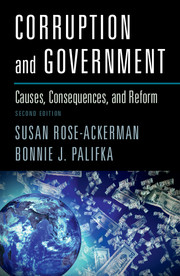Book contents
- Frontmatter
- Dedication
- Contents
- List of Figures
- List of Tables
- List of Boxes
- List of Acronyms
- Preface to the First Edition (1999)
- Preface to the Second Edition
- Acknowledgments
- INTRODUCTION
- PART I CORRUPTION AS AN ECONOMIC PROBLEM
- PART II CORRUPTION AS A CULTURAL PROBLEM
- 7 Culture and Corruption
- PART III CORRUPTION AS A POLITICAL PROBLEM
- PART IV REFORM AGENDAS: DOMESTIC POLITICAL WILL AND INTERNATIONAL INFLUENCE
- CONCLUSIONS
- References
- Index
7 - Culture and Corruption
from PART II - CORRUPTION AS A CULTURAL PROBLEM
Published online by Cambridge University Press: 05 March 2016
- Frontmatter
- Dedication
- Contents
- List of Figures
- List of Tables
- List of Boxes
- List of Acronyms
- Preface to the First Edition (1999)
- Preface to the Second Edition
- Acknowledgments
- INTRODUCTION
- PART I CORRUPTION AS AN ECONOMIC PROBLEM
- PART II CORRUPTION AS A CULTURAL PROBLEM
- 7 Culture and Corruption
- PART III CORRUPTION AS A POLITICAL PROBLEM
- PART IV REFORM AGENDAS: DOMESTIC POLITICAL WILL AND INTERNATIONAL INFLUENCE
- CONCLUSIONS
- References
- Index
Summary
Some claim that “culture,” not economics or politics, is the primary determinant of corruption. This claim takes two basic forms. First, cultures differ, and hence the meaning of “corruption” as the misuse of power for private gain differs across the world. In particular, transactions that are labeled corrupt in highly developed economies and well-established democracies may be perfectly acceptable and even normatively required in other societies. Second, one may acknowledge that corruption – as defined in this volume – is damaging but believe that the only route to reform is through a thoroughgoing change in prevalent social norms, moving beyond narrow economic models of self-seeking individuals:
If we want to really get at corruption, … we need to build up … values of honesty and integrity in society.… Honesty, prosocial preferences and a sense of right and wrong constitute a part of the human psyche …, even though we can create societies where such traits are barely visible.
(Basu 2011: 10)The first critique argues that not all societies aspire to the ideal of state/society relations implicit in our earlier chapters, and that this disjunction needs to be respected by outsiders. The second acknowledges that corruption undermines economic and political development but concentrates on efforts to change norms, especially through the transformation of elite attitudes.
We, of course, recognize that entrenched social norms affect the incidence of corruption and the definition of acceptable behavior. However, the study of “culture” is one part of the larger analytic effort to understand the causes and consequences of corruption. Some behavior – trust in others, for example, or bestowing “gifts” on public servants – may be determined by cultural mores, but it may also be triggered by strategic calculations and guesses about the interests of other actors. One goal of this chapter is to demonstrate that some behavior that appears on the surface to be generous and other-regarding, may, in fact, be based on strategic calculations of self-interest. A second goal is to highlight the way certain traits, often seen as normatively desirable, such as trust, may, in some contexts, undermine beneficial public policies. Before considering these complex cases, however, we begin by asking if certain relatively easy to measure traits, such as gender and religious faith, are linked to the acceptability of corrupt bribes and kickbacks.
- Type
- Chapter
- Information
- Corruption and GovernmentCauses, Consequences, and Reform, pp. 233 - 272Publisher: Cambridge University PressPrint publication year: 2016



